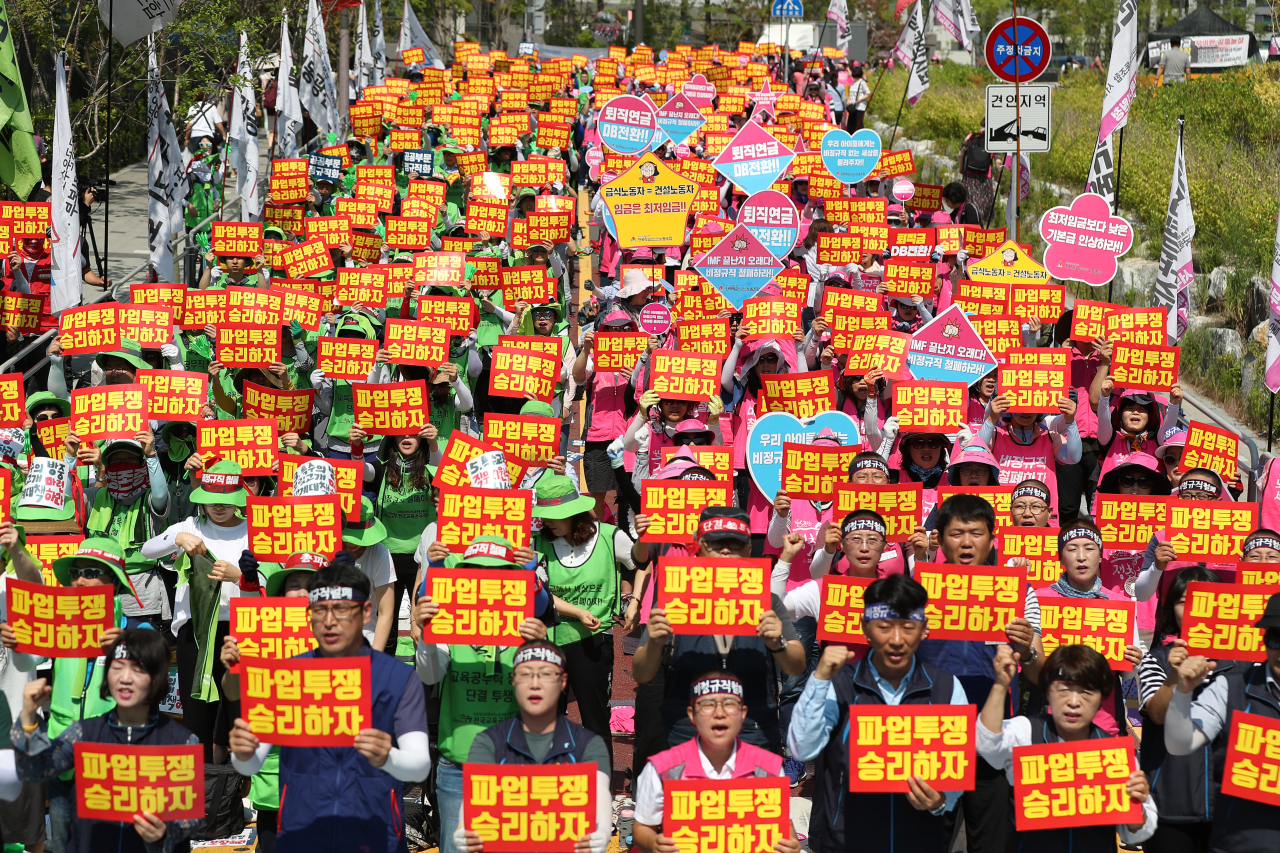S. Korea plagued by back-to-back nationwide strikes by public sector workers
By YonhapPublished : July 5, 2019 - 18:27
(Yonhap) -- South Korea is bracing for a possible unprecedented strike by postal workers next week, as non-regular public employees wound up their three-day nationwide walkout on Friday.
The Korean Confederation of Trade Unions, a militant labor umbrella group, called the three-day strike Wednesday to call for wage hikes for non-regular workers in the public sector, abolition of discrimination against them and the switching of their status to that of regular workers.
Contract workers at elementary and secondary schools nationwide, including cafeteria cooks and after-school daycare service assistants, accounted for the bulk the strike participants, while other public sector non-regulars, including highway toll collectors and cleaners for local governments, also participated in the nationwide joint strike.

The cumulative number of contract school workers who participated in the three-day nationwide strike reached 52,000, the largest on record, the Ministry of Education said. A similar strike staged for two days in 2017 drew a total of 35,000 non-regular school workers.
On Thursday morning, a group of 200 highway toll collectors occupied tollgates of the Gyeongbu Expressway in Seongnam, south of Seoul, blocking traffic for two hours. Police detained 23 of them on charges of impeding traffic. Korea Highway Corp. has set up a new subsidiary to employ 6,500 contract toll collectors. So far, 5,100 of them have joined the subsidiary but the remaining 1,400 are demanding they be put on the regular payrolls of Korea Highway Corp.
The KCTU, whose nearly 1 million members make it one of the nation’s largest labor groups, has been intensifying pressure on the Moon Jae-in government to implement its election pledge to narrow the gap between regular and non-regular workers and switch all non-regular workers in the public sector to regular status.
The labor umbrella group, unhappy with the slowing pace of status switches for non-regular employees under the Moon administration, will again call for a general strike on July 18.
Unionized postal workers said they plan to go on a strike on Tuesday after their negotiations with the management of state-run Korea Post on improving their working conditions and increasing new hires fell through.
The union of Korea Post has called for enforcing a five-day workweek, suspending mail delivery on Saturdays and immediately recruiting 2,000 new postal workers in order to address the problem of manpower shortages and delivery workers’ deaths from overwork.
The agency’s management and the government have vowed to introduce a five-day workweek by year’s end but rejected the two other demands from the postal union, citing budget issues.
The union said it will decide whether to go ahead with the strike on Monday. There has never been a strike by postal workers in the 135-year history of Korea Post.
According to the education ministry, cafeteria lunch service was suspended at 1,474 of 10,454 elementary and secondary schools nationwide Friday, where students were served substitute foods, like bread and milk, or brought their own lunches, while the number of strike participants fell to 13,281 from the previous day’s 17,300.
The ministry noted a total of 8,689 schools operated their cafeterias normally for lunch service, up from 8,277 schools the previous day. It also said after-school daycare service was suspended at 62, or 1 percent, of the 5,980 public elementary schools nationwide.
An alliance of non-regular school workers, which has 95,000 members, said they will not extend their strike after the educational authority pledged to make efforts to raise wages, and other aspects of how non-regular workers are treated, in the upcoming negotiations.
Non-regular school workers have demanded their basic pay be raised by 6.24 percent and discrimination be eliminated in the payment of various allowances. They have also asked that their wages be raised to a level equivalent to 80 percent of the lowest-ranking civil servants’ pay from the current 60 percent during the tenure of the Moon Jae-in government. But the education authorities have just proposed a pay hike of 1.8 percent for them.
The alliance claimed that the actual number of contract school workers who joined the strike reached about 100,000 for three days. It also argued that steep pay hikes are necessary for about 151,000 non-regular school workers, as their monthly wages average 1.64 million won ($1,400), compared with a state-recommended minimum monthly salary of 1.74 million won.
The decision to end the strike came one day after Prime Minister Lee Nak-yon asked the unionized workers participating in the strike to trust the government and try to find a compromise with their management.
“The government has turned many of the non-regular workers in the public sector to regular ones for the past two years, and improved their work conditions, including wages,” Lee said during a government meeting in Seoul on Thursday. “But we have no other choice but to improve the matter in stages because it requires budgetary funds.”
He stressed that the government remains firm in its will to consistently improve treatment for the workers considering the financial situations and management conditions of each organization they work for. (Yonhap)











![[Today’s K-pop] BTS pop-up event to come to Seoul](http://res.heraldm.com/phpwas/restmb_idxmake.php?idx=644&simg=/content/image/2024/04/17/20240417050734_0.jpg&u=)





![[KH Explains] Hyundai's full hybrid edge to pay off amid slow transition to pure EVs](http://res.heraldm.com/phpwas/restmb_idxmake.php?idx=652&simg=/content/image/2024/04/18/20240418050645_0.jpg&u=20240419100350)

